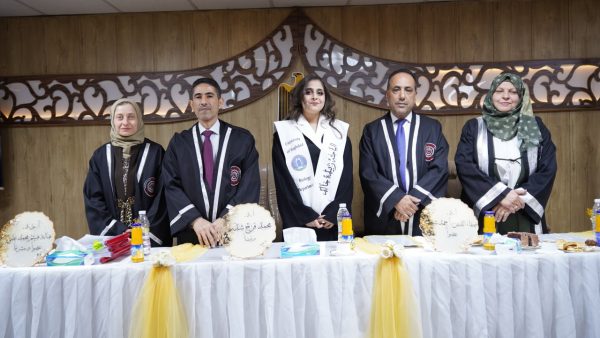College of Science for Women / University of Baghdad examined the master’s thesis entitled “ Molecular Detection of Heterogeneous Vancomycin Resistance Genes in Clinical Staphylococcus aureus and Bioactivity of Selenium Nanoparticles Against Bacterial Isolates” submitted by the the student Zubaydah Khalid Ibrahim. Master’s degree in Biology/ Microbiology, Supervised by Assist. Prof. Dr. Halah Haitham Mohammed Ali.
The thesis discusses on genotypic variations and clinical significance of hVISA Isolates and Study of the Antibacterial Effects of Selenium Nanoparticles on Bacteria Isolated from Diabetic Patients in Baghdad.
The thesis aims to investigate hVISA isolate and determine of hVISA, VISA, and VRSA in clinical patients and to explore the genotypic variations and clinical significance of hVISA isolates diabetic patients in Baghdad. This study involved 25 patients suffering from diabetic foot and urinary tract infections, and it also included two stander samples. After diagnosis using the Vitek 2 system and genetic diagnosis via 16S rRNA and a set of biochemical reactions, the antibiotic resistance profile of all isolates was determined using the disk diffusion method and the minimum inhibitory concentration (MIC). The detection of hVISA isolates was confirmed through population analysis profiling (PAP-AUC) area under the curve analysis, followed by whole genome sequencing. A guava leaf extract was also prepared to study the antibacterial effect of selenium nanoparticles against the bacterial isolates.
The most important recommendations which the study has come up:
- Detection rate of heterogeneously Vancomycin- Intermediate Staphylococcus aureus (hVISA) isolates from different sources.
- Development of effective therapeutic strategies after monitoring the development of antibiotic resistance in hVISA isolates.
- Selenium nanoparticles (SeNPs) may provide advantages for various pharmacological applications against methicillin-resistant Staphylococcus aureus (MRSA) in diabetic patients and patients with other conditions.
- Using antibiotics combined with selenium nanoparticles (SeNPs) as a robust system to combat the prevalence of hVISA and VRSA.
- Guava leaf extract (Psidium guajava) can be used as an antimicrobial agent against bacteria isolated from the respiratory system and as a treatment for respiratory diseases.
- Study the effect of selenium nanoparticles (SeNPs) on the gene expression of resistance genes in these bacteria.
Final Grade: Excellent
Molecular Detection of Heterogeneous Vancomycin Resistance Genes in Clinical Staphylococcus aureus and Bioactivity of Selenium Nanoparticles Against Bacterial Isolates.
College of Science for Women / University of Baghdad examined the master’s thesis entitled “ Molecular Detection of Heterogeneous Vancomycin Resistance Genes in Clinical Staphylococcus aureus and Bioactivity of Selenium Nanoparticles Against Bacterial Isolates” submitted by the the student Zubaydah Khalid Ibrahim. Master’s degree in Biology/ Microbiology, Supervised by Assist. Prof. Dr. Halah Haitham Mohammed Ali.
The thesis discusses on genotypic variations and clinical significance of hVISA Isolates and Study of the Antibacterial Effects of Selenium Nanoparticles on Bacteria Isolated from Diabetic Patients in Baghdad.
The thesis aims to investigate hVISA isolate and determine of hVISA, VISA, and VRSA in clinical patients and to explore the genotypic variations and clinical significance of hVISA isolates diabetic patients in Baghdad. This study involved 25 patients suffering from diabetic foot and urinary tract infections, and it also included two stander samples. After diagnosis using the Vitek 2 system and genetic diagnosis via 16S rRNA and a set of biochemical reactions, the antibiotic resistance profile of all isolates was determined using the disk diffusion method and the minimum inhibitory concentration (MIC). The detection of hVISA isolates was confirmed through population analysis profiling (PAP-AUC) area under the curve analysis, followed by whole genome sequencing. A guava leaf extract was also prepared to study the antibacterial effect of selenium nanoparticles against the bacterial isolates.
The most important recommendations which the study has come up:
- Detection rate of heterogeneously Vancomycin- Intermediate Staphylococcus aureus (hVISA) isolates from different sources.
- Development of effective therapeutic strategies after monitoring the development of antibiotic resistance in hVISA isolates.
- Selenium nanoparticles (SeNPs) may provide advantages for various pharmacological applications against methicillin-resistant Staphylococcus aureus (MRSA) in diabetic patients and patients with other conditions.
- Using antibiotics combined with selenium nanoparticles (SeNPs) as a robust system to combat the prevalence of hVISA and VRSA.
- Guava leaf extract (Psidium guajava) can be used as an antimicrobial agent against bacteria isolated from the respiratory system and as a treatment for respiratory diseases.
- Study the effect of selenium nanoparticles (SeNPs) on the gene expression of resistance genes in these bacteria.
Final Grade: Excellent










